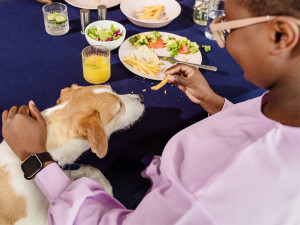Blackberries are the lesser-known cousins of raspberries, and while they may not be as easy to find in the grocery store, they grow wild in many parts of the country. They are sweet and juicy and often used to make jams or are simply eaten fresh. If you are a blackberry fan, you may be wondering if you can share them with your pup, too.
The answer is yes, in moderation, blackberries are safe for dogs to eat, and they may even provide some health benefits. Read on to learn more about sharing blackberries with your dog.
Nutrition facts about blackberries for dogs
Blackberries are the fruit of certain plants in the genus Rubus. There are multiple species of plants in this genus that all produce very similar fruits. These plants tend to grow in a thicket-like dense mass of thorny vines.
Technically, the blackberry is not a classic fruit in the scientific sense but is considered an aggregate fruit since it is a clump of individual seeds surrounded by fleshy fruit, known as drupelets. Blackberries have edible seeds, which makes them very high in fiber and they are low in sugar compared to many other fruits. They also pack a punch of powerful antioxidants and polyphenols that are suspected to have many additional health benefits.
How much do you spend on your pet per year?
Are blackberries good for dogs?
Blackberries are safe for dogs to eat in moderation, and they can provide some health benefits so long as they are offered as just an occasional snack. A dog’s primary source of nutrition should be a complete and balanced dog food diet. Some of the benefits that come from blackberries include:
High fiber: Fiber is a nondigestible carbohydrate that promotes healthy digestive function. It helps to bulk up the stool, prevent constipation, create feelings of fullness, and provides important nutrients to the helpful microbes in the gut.
Vitamins and minerals: Blackberries are especially high in vitamins C, E, K, and manganese. Unlike us, dogs do not need to get vitamin C from their food, as they can synthesize their own. However, these other vitamins and minerals have many crucial functions in the body.
Polyphenols: Blackberries are also rich in certain plant compounds called polyphenols, which include antioxidants and the pigmented compound, anthocyanin. These compounds are believed to have many health benefits including reducing inflammation, slowing the aging process, protecting against certain cancers, boosting brain health, and protecting the heart.
Can dogs eat any part of the blackberry plant?
Blackberry plants in the Rubus genus are considered nontoxic, so even if your dog decided to sample the leaves or stems of a blackberry plant, they would not be at risk for serious illness. However, the plants can be thorny, so dogs may be at risk for scratches and wounds if they are crawling around inside a thicket of blackberry plants.
These thorns could also injure their mouth, tongue, and/or digestive tract if they were to ingest them, so it is best to discourage your dog from eating them. Additionally, while the leaves are technically nontoxic, they are very fibrous. Dogs who ingest a large amount of fibrous plant material are at risk for digestive upset including vomiting, diarrhea, bloating, and gas.
Are blackberries completely safe for dogs?
Blackberry fruits are quite safe for dogs as long as they are offered in moderation. Here are a few points to keep in mind when sharing blackberries with your pup:
High-fiber content: While fiber is a healthy part of your pup’s diet, too much fiber suddenly can lead to digestive upset including vomiting, diarrhea, bloating, and gas. If your dog is not used to eating high fiber foods like raw fruits or vegetables, be sure to start slow with just a bite-sized taste, and see how they tolerate it.
Sugar content: Blackberries contain less sugar than many other fruits, making them a good choice for the occasional snack for dogs. That said, you should be mindful about any additional sugar in their diet as this adds calories and can lead to unhealthy weight gain and related complications like arthritis and/or diabetes.
Additional ingredients: If you are considering sharing prepared foods made with blackberries, be sure to double-check that all the other ingredients are also safe for dogs. Avoid products that may contain toxic foods as well as unhealthy ingredients such as high fat foods, fried foods, and/or food that are high in sugar.
The bottom line: Can dogs eat human food?
Yes, dogs can eat human food, and there are so many great options if you are looking for healthy snacks that you can share with your pup. Always double-check that the foods you are planning to share are safe and nontoxic to dogs, as there are some foods that are never safe for dogs. Also, keep in mind that all of these snacks should really be kept to a minimum in order to keep your dog at their healthiest. Dogs need to eat a complete and balanced diet in order to get all of the nutrients they need in the proper proportions, so a dog food diet should provide the bulk of their daily calories.
Snacks and treats should be less than 10 percent of their intake in order to ensure they eat enough of the nutrients they really need without adding too many extra calories. Unintentionally overfeeding your pup by offering too many treats and snacks throughout the day can put them at risk for weight gain, and dogs can develop secondary health problems as a result of being overweight.
In addition to providing a healthy balanced diet, it is also critical that dogs get plenty of exercise for both their minds and bodies each day. Dogs have such different exercise requirements depending on their personality, breed, and age; however, they should all get daily walks and play sessions to keep them moving. Treats and snacks can be a great motivator for getting your dog moving, making play sessions more fun, and enriching their minds with food puzzles, too.
Other foods that are safe for dogs
Sweet potatoes can be a sweet and healthy treat for your pup.
Eggs are a high protein snack option, too.
Carrots make for a crunchy and satisfying treat.
Other foods that are dangerous
Grapes and raisins are toxic and should never be shared.
Onions and other plants in the Allium family are also considered toxic to dogs.
Chocolate and these other toxins should also be avoided altogether.
FAQs (People Also Ask):
How many blackberries can a dog eat?
Start with just a bite-sized amount; they are high in fiber and too many may cause digestive upset. All snacks should be less than 10 percent of a dog’s daily intake.
Is it OK to give dogs blackberries?
Yes, blackberries are safe and nontoxic but should be shared in moderation to avoid digestive upset.
Why do dogs like blackberries?
Dogs may like the juicy, sweet taste of the blackberries as well as the satisfying texture.
Are blackberries good for dogs?
Blackberries provide some valuable health benefits for dogs but should not replace a complete and balanced dog food diet.











